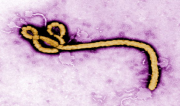Article
Auburn Team Joins Search for Ebola Medication
Author(s):
Researchers at Auburn University are joining what is becoming a crowded field of teams looking to develop a drug to treat future outbreaks of the Ebola virus.

Researchers at Auburn University are joining what is becoming a crowded field of teams looking to develop a drug to treat future outbreaks of the Ebola virus.
While two American patients were recently treated with an experimental serum called ZMapp, that drug has not yet been tested in human trials. A statement from Auburn said the researchers hope their work will result in a drug that could slow or stop future Ebola outbreaks from killing so many people.
Results from the Auburn researchers, under the guidance of Stewart Schneller, PhD, a professor of chemistry and biochemistry, will be published in Bioorganic and Medicinal Chemistry.
“In simple terms, the Ebola virus has the ability to turn off the body’s natural immune response,” he noted. “We have made a small tweak in compound structure that will turn that response back on.”
According to a Fox News story, the Auburn research team has developed a compound, known as WY3161, which has shown progress in reversing the ability of different viruses to block the immune system. Researchers have tested the drug using cells from infected green monkeys.
With no drugs currently approved to treat Ebola and only limited supplies of the experimental drugs being tested, Schneller said he believes a successful product could benefit people around the world.
“Vaccines offer a promising therapeutic approach, but they can’t be given to everyone in a population, including the young, the elderly, and those with compromised immune systems,” he said. “This and other factors support the need for drug therapy as we fight this disease.”
The statement from Auburn said Schneller has been studying the virus for more than 10 years and has worked in drug design for other illnesses like smallpox, yellow fever, and hepatitis C.


